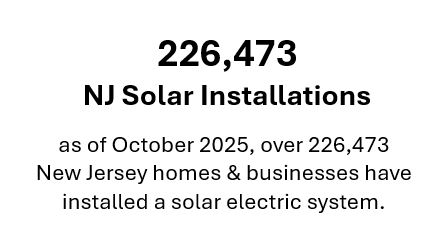Solar Market Frequently Asked Questions (FAQs)
- Does the Clean Energy Program still offer rebates for solar projects?
- How long will it take to receive an acceptance letter for my solar project once I submit my SRP registration package?
- When will I get my New Jersey certification number?
- How has New Jersey become such a leader in solar energy?
- Why is New Jersey considered a ‘model program’ for solar development?
- What has been the result of this integrated approach?
- What are your goals for the growth of New Jersey’s solar program?
- How do New Jersey’s program participants recover the cost of installing a solar system?
- How does market-based financing work?
- What is “Net Metering”?
- NJ has some of the best interconnection and net metering policies in the country. How do they work and why are they so beneficial to consumers?
- Where can I find more information on New Jersey’s EDC solar financing programs?
- What is a Solar Renewable Energy Certificate (SREC)?
- How do SRECs help finance solar development?
- Who owns the SRECs produced by a solar generator?
- Who buys SRECs?
- Why can't I just sell my SRECs to the utility company directly?
- How long will my system generate SRECs?
- How is the price of the SREC determined?
- Does the BPU guarantee SREC prices?
- Does money from the sale of SRECs need to be treated as taxable income?
- How would replacing new solar panels on an existing solar array impact the SRECs that are currently being collected from that system?
- What happens if I sell my house?
- Can I move my solar energy system to a new property?
- I have lost my username/password - do I need to create a new account?
- What if I change or add additional equipment to my solar system?
- If my system was installed prior to receiving a rebate commitment letter, do SRECs go back to the interconnection date?
|
Does the Clean Energy Program still offer rebates for solar projects? When will I get my New Jersey certification number?
When the inspection has passed or has been waived, the project status will be moved to "Complete". A notification will be sent with the New Jersey certification number within 2-3 weeks from the date the inspection report is received or the date of the waiver letter. How has New Jersey become such a leader in solar energy? Why is New Jersey considered a ‘model program’ for solar development? Since the inception of the New Jersey’s Clean Energy ProgramTM (NJCEP) in 2001, New Jersey has developed a model program and an integrated approach to solar development that includes:
What has been the result of this integrated approach? What are your goals for the growth of New Jersey’s solar program? This law changes the NJ RPS solar requirement to an annual percentage from an annual fixed Gigawatthours (Gwhrs) requirement (see tables below). RPS SACP How do New Jersey’s program participants recover the cost of installing a solar system? How does market-based financing work? What is “Net Metering”? In New Jersey, all BPU-regulated Electric Distribution Companies and electricity suppliers offer net metering to their residential and commercial customers that generate electricity on the customer’s side of the meter, using Class I renewable energy sources, provided that the generating capacity of the customer-generator’s facility does not exceed the customer’s annual electric consumption. Together, our interconnection and net metering rules ensure solar generators are compensated for the clean, renewable energy they are generating, and that New Jersey ratepayers share in the benefits of solar and other small renewable energy generation. NJ has some of the best interconnection and net metering policies in the country. How do they work and why are they so beneficial to consumers? New Jersey now requires utilities to follow a standardized process, making it easy to connect to the grid. This is critical to getting the full value of small generation systems for both the customer and for New Jersey. One of the key benefits of solar electric generation, for example, is that it can offset peak demand. During the summer, when air conditioners are running full tilt, solar electric systems are also producing at near peak capacity reducing strain on the distribution systems and the need for heavily polluting sources of peak generation. Where can I find more information on New Jersey’s EDC solar financing programs? What is a Solar Renewable Energy Certificate (SREC)? How do SRECs help finance solar development? Who owns the SRECs produced by a solar generator? Who buys SRECs? New Jersey’s Electric Distribution Companies (EDCs), who provide regulated electric transmission and distribution services, offer solar finance programs that provide competitive long term contracts for SREC off take or loans in exchange for the SREC amortization. The SRECs procured under each model are auctioned to buyers for use toward NJ RPS compliance by electric generation suppliers and providers. Why can't I just sell my SRECs to the utility company directly? How long will my system generate SRECs? How do I determine if I am eligible for 10 or 15 year SREC Qualification Life? On October 29, 2018 the New Jersey Board of Public Utilities clarified the language above as follows: NJ SREC Update: Implementation of New 10-year SREC Term. How is the price of the SREC determined? Does the BPU guarantee SREC prices? Does money from the sale of SRECs need to be treated as taxable income? How would replacing new solar panels on an existing solar array impact the SRECs that are currently being collected from that system? 1. If you are only changing out the solar panels to new ones, this change could result in a system size change in which case you would need to submit a “System Change Form” to PJM GATS found online at https://www.pjm-eis.com/documents, specifically https://www.pjm-eis.com/-/media/DotCom/pjm-eis/documents/gats-ownership-change-form.pdf. You must also send an email to Board Staff about this change to NJREINFO@NJCleanEnergy.com. 2. If the system has more than 12 months of Qualification Life, this change can be done and will not impact the SREC value. However, at the end of the Qualification Life, then the system will revert to earning Class I RECs, whether or not changes are made. 3. If you want to continue to collect SRECs with the system after the end of the 15 years, or term of the Qualification Life, then the entire system would need to be replaced with new equipment and decertified, and then you would have to apply under the ADI Program to earn SREC-IIs. What happens if I sell my house? There are several alternative models of solar energy system ownership in New Jersey’s solar market. Ownership of SRECs often remains the same as ownership of the solar energy system. Frequently, the ownership of SRECs is transferred by the owner of the solar energy system to a third party in exchange for a reduction in installed costs. It is also common for property owners to lease their property to a solar energy system owner in exchange for reduced electricity costs under a Power Purchase Agreement. SREC ownership under each of these models must be recorded with the SREC administrator, currently PJM-EIS GATS (Generation Attribute Tracking System). Can I move my solar energy system to a new property? I have lost my username/password - do I need to create a new account?
Please visit www.pjm-eis.com, call 610-666-2245, or email the administrator at GATSAdmin@pjm-eis.com. What if I change or add additional equipment to my solar system?
If you make any changes, such as adding additional modules, changing inverters or changing your meter, you must fill out and submit a Major System Change Form to GATS. If my system was installed prior to receiving an SRP Acceptance Letter, do SRECs go back to the interconnection date?
Yes, SRECs can begin with the interconnection date as long as GATS is still issuing SRECs for the current reporting year. The reporting year in New Jersey runs from June 1 to May 31. |









.jpg)
